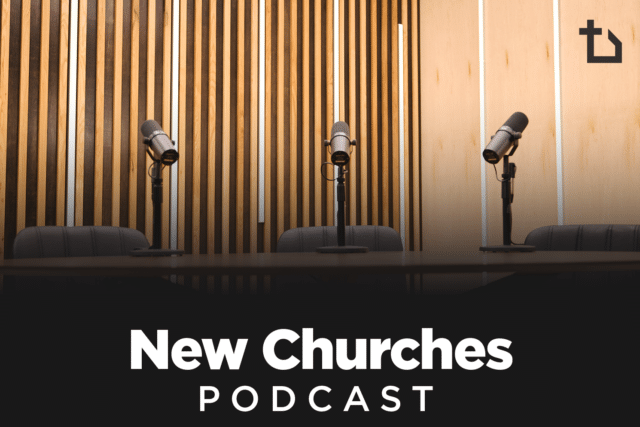Article
10 Rules of Church Planting
Clint Clifton says aspiring church planters are always asking him, “What’s the most important church planting advice you can give me?” Here are the 10 pieces of advice he gives most often.

For the past five years or so I’ve had this poster hanging on the wall of my office. I had the poster made after about the 10,000th time an aspiring church planter asked me, “What’s the most important church planting advice you can give me?”
Josh Turansky of the “Pastor’s Perspective” radio program interviewed me about the 10 pieces of advice I have for aspiring church planters. (You can listen to the audio clips of the interview here.)
Josh Turansky: You have on your wall a sign or a plaque that says “10 Rules of Church Planting.” Let’s go through these 10 rules. The first one here is “Churches plant churches.”
Clint Clifton: Yeah, so just as a preface, these are things I say all the time to aid when I’m talking to church planters; they just come up all the time. Also, probably the most common question I get from church planters, “What’s your most important piece of advice you would give me if I’m about to start a church?” And so, these are things I dole out regularly, all the time, and I’ve just been saying them for a long time and people have started repeating them back to me. Some of them I stole from other people. Some of them, maybe, the phrase’s original but the thought’s not. So there’s really nothing original in here, so don’t attribute it to me, just share it as liberally as you want. We’ll post the photo of it in the show notes, but just understand, these are things I think are truisms in church planting, and some of them are just mindsets I encourage you to adopt as a church planter. So, the first one.
Josh: Churches plant churches.
Clint: Yeah, churches plant churches. So, what I mean by that is that churches should be and are rightly initiated by other churches. Now, it is true that most churches that get planted, get planted by other churches, but it is also true that most churches that get planted, get planted out of frustration that happens in other churches. So, really, church splits would be kind of like the extreme example of that where somebody gets so frustrated that the congregation literally divides into segments. And so, that’s obviously not a healthy version of church planting. The healthiest version of church planting is that a church out of love and worship for God says, “There are a group of people in X place or in Y place that don’t have access to the gospel in the same way that the people in this community do. And so, we want to take some of the brothers and sisters we love very much and send them there so those people can have access to the gospel.” So, that church is in pursuit of those people so they are more likely to come to faith in Jesus. So yeah, churches do that.
Now, the reason we say that is because church planters often get distracted on this one. They think they plant churches, so the most common surrogate here is that the church planter would think himself to be kind of the center of that, but church planters don’t plant churches. If a church, in essence, rises and falls on the success of the church planter alone, it’s very likely to fail because church planters often fail. They often fall out of everything. It’s sort of like putting all your eggs in one basket. When a church owns the problem of lostness in a community though, if the church planter flakes out, the church obviously does what the church would do and continues to go after the problem. We have had a situation in our church where several times, over and over again, where a church planter for some reason – the ministry is ineffective or it’s not working or something’s not going well about it — and we’ve had to reshuffle the deck and kind of change our personnel and swap things around, but we continue to pursue bringing the gospel in that community because if it mattered at one time, it matters now.
Also, we get confused. We think denominations do it, or networks do it. Actually not. Send Network doesn’t plant churches. New City Network doesn’t plant churches. You could go on and on. Those organizations don’t plant churches. At the end of the day, really, what they do is facilitate the churches’ movement to plant churches, but individuals and groups of individuals, known as churches, initiate the planting of new churches. That’s the right way. That’s how it’s supposed to be. And so, anytime we get our heads, you know, wrapped around somebody other than a local church with a burden for the lost, planting a church, something not right about it. The analogy I always use on this one is, “Of course it’s possible for anybody to become a mom or a dad. They might have the mechanisms to pull that off, but that doesn’t mean it’s right.” There’s a right way for a family to get started, and when I say churches plant churches, I’m describing the right way for a church to get started.
Josh: Man, that is so good, and you’ve lived that out by example for years now. Let’s go to No. 2: “Your family is your first flock.”
Clint: Yeah, I love Matthew Henry on this one. He says the family is like the pastoral Petri dish. It’s like a place where an experiment is done. Your household is a place where an experiment is done and the experiment is, “Is this person of pastoral quality? Can he pastor this small flock?” The small flock’s your family, right? So, can this man care for the spiritual needs of these people? Can he impart the gospel to them? Can he help them repent? Can he be patient, kind, gentle, self-controlled with them? Can he live out the pastoral ministry inside the walls of his own house? In some ways, that’s the easiest place to do it. In some ways, it’s the most difficult place. And if he can do it there then that is an indicator to us that he could do it on a larger scale. Maybe he could do it in a small group. Maybe he could do it in a small church, a house church, or maybe he could do it in a larger church, but that principle in Scripture, “If he’s faithful with little, he will be faithful with much,” applies very specifically here. Your family is your first flock and the Scripture even tells us in the qualifications for pastoral ministry that if he can’t manage his own household, how can he be fit to manage the household of God? So, the scriptural qualifications for pastors point to this reality that your family is your first flock. And so, you’re never a better pastor than you are in your household is another way we would say that. That is another rule I just am constantly saying to guys.
Josh: Yeah, it’s huge, it’s like the proof in the pudding. There have been times and seasons in the church and some tribes that under-emphasize that, and it really bleeds through into the rest of the picture. OK, let’s go to No. 3: “You cannot provide everything your church needs.”
Clint: Yeah, three and four are connected. That means you do not have all the gifts, tools, resources at your disposal to properly build, begin, facilitate your church’s starting. Other Christians are needed in order to do that well. So, the idea that you’re going to be this like Lone Ranger church planter and you’re going to go out there and give the church everything it needs. You don’t have the leadership gifts your church needs. You don’t have the fruits of the Spirit your church needs. All of those are represented. You certainly don’t have that fivefold ministry we read about in Ephesians 4. You don’t have all that stuff, so you have to assume that if God is at work, then He’s going to use other people and other means and other churches to help provide some of the pieces of that puzzle.
I see too many church planters thinking that they’re essentially the savior to a community, but it comes out in the way they talk about their own church as the salvation for the community when, if God gives the mercy for it to be true, it’s a place where people can come and meet Jesus, but it’s not the salvation for the community, for anybody’s community.
Josh: Man, that’s so great. What a great point. Four, you said is tied in. It says, “If God is calling you, He is calling others.”
Clint: Yeah, just this idea that you are going to plant a church, but if God is working in you to plant a church, wouldn’t a sovereign God who cares about the planting of a church in a place call more than just you to do that? It seems rational that it wouldn’t be just you alone. I think some guys have like a Moses syndrome. It’s me alone. All that has to be done in this church plant rests on me, when really God’s calling you to be an initiator and to get things going and, if it’s done right, the testimony will be God was doing something and I got to be part of it, not I did something and it was great.
Josh: Yeah, amen. OK, let’s go to No. 5.
Clint: Yeah, “Build in the beginning what you want in the end.” This is probably the most common piece of church planting advice I give. Now, picture a “V” in your mind. OK, when the church is very small you’re at the point of that “V,” the bottom of the funnel, right? So, if you want your church to be compassionate to the poor when the church is large and strong, then you have to be compassionate to the poor when the church is small and weak. If you want it to be about church planting, if you wanted to have a culture of leadership development … so on and so forth. Whatever you want to be true of the church in maturity, there has to be a kernel of that in the beginning of the church’s life. The reason is because it’s very difficult to change the culture of something once it gets going.
For example, a couple things that I’ll tell you in our church. We set out to plant a church and every offering we ever took, there was a portion of it that’s going to support other new churches. Church planting was important from the beginning. So, we put a kernel of that, a little tiny fraction of our budget that was going to church planting. Actually it wasn’t a small fraction; it was a large percentage, but it was a small amount. Now the church is much larger, the budget is much larger and it’s a large amount now. And so, people look at us and say, “Wow, how do you give so much money to church planting? How do you get so much energy and focus to church planting?” Well, we do it because we did it when it was really small and nobody even asked along the way because it grew with the proportion of the church. We just shimmied the ratios a little bit in the early days. We built in the beginning what we wanted in the end. We’ve heard it said that guys tend to overestimate what they can accomplish in two years and underestimate what they can accomplish in 10 years. And so, there’s this important thing you have to do as a leader: You have to anticipate the changes that will come to your church over time and that some of the anticipated changes are it’s going to get bigger, more complex, more difficult. So, introducing an idea like church planting at Year 5 or 6 or 10 of a church is just not going to happen unless you have like exceptional leadership abilities.
Josh: Man, that’s so good. No. 6: “Brutally honest feedback is your friend.”
Clint: Yeah, so I just encourage you to build feedback loops in. Pastors get into this zone where they’re the experts and everybody else learns from them, and the problem with being an expert is there’s nobody to learn from, especially if you view yourself to be an expert. I think pastors often forget they’re members of the congregations they serve; they need the gospel just like everybody else does. And if you set up the scenario, when you’re working with other people, as “I’m the expert. I’m the person everyone has to go to for the right answers,” then you’ll find the weight of that is crushing as the church gets larger and as the ministry gets more complicated. And so I would really just encourage you to set a way for there to be a culture of honest feedback in your church.
Josh: And you guys at Pillar, you have some kind of review form, right?
Clint: Yeah, we do. It’s actually in the back of the Church Planting Thresholds book. It’s a service review form. We’re talking specifically about our worship service, so we’re asking things like, “How was the sermon?” “Was the gospel clear in the sermon?” “Was the sermon compelling?” “Was it helpful?” So we’re getting critical feedback on the sermon. We’re doing the same thing with the music, the tech, all the elements of the worship service and on other times during the rhythm of the life of the church. We’re evaluating other things about our ministry – how we’re discipling, all those things. There has to be brutally honest feedback in a culture where you can say something honest and it’s not seen as argumentative or spiteful or hurtful. And if it’s not regular, if you’re not normally giving critical feedback, then it feels painful when it comes because it’s rare. So we don’t want it to feel like that. We want it to feel very common, just a place where we commonly talk about our works and we own them and you’ll find that kind of culture makes everything better all the time. Things are always getting better, always improving.
Josh: OK, four to go. No. 7: “Pastors are professional forgivers.”
Clint: Yeah, I don’t know that that needs a lot of explanation, but it’s true. You will.
Josh: Wounds, you’ll get wounds.
Clint: I was not prepared for the amount of artillery that would come my way. Now I look back and always go, “I was just thin skinned. I was extra sensitive.” But pastors have to be tender-hearted and thick-skinned, and many pastors I know are thin-skinned and hard-hearted. It’s really important that we see ourselves as professional forgivers. We are the chief example in the church of the person who has received much grace, and we should be distributing grace liberally, freely. If you can’t forgive people quickly, you will find that your ministry is really, really difficult.
Josh: Absolutely necessary, that’s really important. OK, No.8: “No one owes you support.”
Clint: Yeah, I think of this scenario where the guy worked at a big church and then he decides to go plant a church and he rolls off and he tells his church, ”Hey, I’m going to plant a church,” and they said, “Great! Praise the Lord! We’re glad for you, excited for you.” And then he expects the checks to start rolling in or them to pay his salary or part of salary, and they don’t do that. Then he gets angry with them. I just remind everybody, no, you’re not entitled to anything. This decision to go and plant a church was a decision between you and Jesus. Hopefully, your church sent you and it was a decision between your leadership of your church and Jesus and you. Hopefully there were other people involved and, to the extent that there are other people involved, those people will bear the weight with you. But if you’re an individual who just kind of said on your own, “I’m going to go plant a church,” it’s just almost comical to me, the number of church planters who get angry with people they thought should support them that don’t support them.
I watch church planters all the time, work with them all the time. The most common thing that happens is the people you most expect to support you, don’t support you, at least in the way you think they should support you. And then the people that do end up supporting you are people who come totally out of left field. It’s like some aunt that you didn’t know about, some random person off the internet, some church you never expected. It’s just the way it works. God keeps us humble in that way, so if you spend your time getting crammed up about the people who didn’t support you, that you think should support you, you’re going to be mad the whole first couple years of your church planting journey.
Josh: That’s another good one, man. Oh, these are rich. OK, No. 9: “Church planting is free.”
Clint: At the end of the day, I mean, we all get caught up on the money thing, but the things Jesus calls us to do in church planting, the things the Scripture commands us to do, none of them cost anything, I mean, really. Everything that’s expensive about church planting is something you’ve added on top of the scriptural requirement. You can test that one through and through, but you can make disciples, you can evangelize, you can build the church, you can grow people, you can even make networks and systems. You can do all of that for free, and in every community there are thousands of free places to meet called houses. They’re free and even there are public gathering places that are free. I know it’s hard to believe, but if you look hard enough and you’re willing to flex on some of the things you think are essential or critical, there are free places to meet. I know in our region we’ve got dozens of churches that meet in free locations. So yeah, I just would say that church planting doesn’t cost anything and if you ever feel tempted to make the excuse that, “I can’t do this because I don’t have enough cash or don’t have enough of X resource,” you’ve kind of manipulated yourself into believing something that’s not scripturally commanded about church planting.
Josh: That’s really important because you’re not saying this to encourage the church planter to be stingy or cheap, but you’re saying it to help them with their expectations.
Clint: Yeah, you’ve got to see resources that come in for the church plant – either from your core team or your members or other churches or other individuals – you’ve got to see those as bricks to build the thing. They’re good to have, but they’re not required. They’re assets; they’re helpful. Sometimes they’re distracting. You know, having too many resources can be as bad a distraction. I’ve seen more church plants fail from over-resourcing than under-resourcing.
Josh: Great, OK, No. 10.
Clint: Yeah, this is the last one and maybe for a lot of American church planters, it’s the most important one: “The numeric growth of your church is the quickest path to sustainability.” Now, church planters often think the sustainability will come through partnerships. We got to get a lot of partnerships, but if I see a church planter spending an inordinate amount of his time working with other pastors, then I am thinking this guy is not going to do well in the long run because he’s so concerned about securing his personal financial welfare, that he’s not putting the new church in the center of focus. He’s putting the securing of his paycheck in the center of his focus, and for most guys it’s hard to do both of those things really well.
So, I would say the quickest path to sustainability – to financial security for you and your family and your church plant – is the growth of your new church. Grow the church. I’m just amazed at the number of churches that have been going for five or six or 10 years and they’ve got just a dozen people or less. And they say, “We’re doing all the right things,” and I want to say, “No, you’re not, and you’re not even asking the right questions.” I know it’s hard to plant churches. Trust me, I did it. I wasn’t very good at it. I know it’s hard, my church grew really slow too, in the beginning. And so, I understand all those things. I’m just saying that if you don’t figure out what the problem with growth – Why aren’t people coming to your church? Why aren’t people staying at your church? – then your church will never be sustainable. You’ll get money from other churches, and that money will essentially go into the wind because, at the end of the day, you will not be able to sustain it and the church will have to close. And so I just encourage you to focus on growth. I know we’re so anti-pragmatism right now that it’s seen as evil or wicked or wrong to focus on church growth. Those are people with souls that Jesus died for, every one of them. Them hearing the gospel and the church growing; them growing in community is a great thing. Don’t run away from that.
Josh: Man, that is really important. Great, 10 rules of church planting. There you go.




